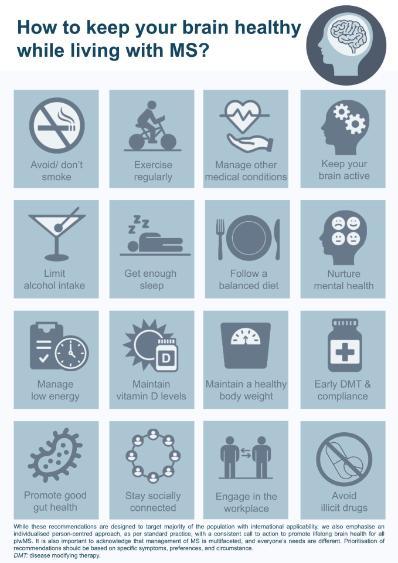November 20, 2024
Lifestyle changes can boost brain health and slow decline for people living with MS
New study reveals the 16 evidence-based recommendations to improve quality of life and manage complex disease
Brain health is fundamental to good health, particularly for those who are living with multiple sclerosis (MS). It plays a critical role in managing the disease, which affects the brain and spinal cord, slowing down its progression.
Now, a new study led by the University of ÌìÃÀ´«Ã½ (UOW) could provide a comprehensive framework for how people living with MS can maximise their brain health through lifestyle changes, such as diet and exercise, and the tools they can use to make this change.
Olivia Wills, PhD candidate in UOW’s EatRightMS research group and scholarship recipient from , led the , published in international journal .
The study followed a Delphi method, drawing on the input of a group of Australian experts, such as healthcare professionals, researchers, advocates, and people with lived experience of MS.
Over a period of four months, Olivia (pictured above) surveyed the experts on their level of agreement with recommendations to maintain and optimise brain health for people living with MS. The experts came to a consensus on 16 key actions.

While MS presents differently in every person, Olivia said improving brain health is crucial to helping people manage their disease and slow the decline caused by the disease.
“MS affects the brain and spinal cord and it can cause damage that isn’t always visible or easy to detect. This means that people living with MS can experience very different symptoms and diseases progressions,” Olivia said.
“New research suggests that the brain’s ability to compensate for damage, known as ‘brain reserve’, can help protect against MS-related decline. However, when the brain’s compensatory abilities are overwhelmed, the effects of MS become more noticeable, leading to problems like cognitive decline and difficulty with daily tasks.”
Olivia said “many people living with MS know these recommendations but still struggle to make lasting changes. Healthcare and other professionals play an important role in helping individuals make these lifestyle changes, but they often lack the time or resources to provide in-depth support during clinical appointments.”
“It is not uncommon for people living with MS to feel unsupported and unsure of how to make the necessary changes to maximise lifelong brain health. This gap between knowledge and action is an international problem.”
Olivia’s study also provided an expert-informed framework for behavioural change, to help people living with MS to prepare for and modify their lifestyle.
“Change can be really hard but we don’t want that to be a deterrent to adopting lifestyle changes that will have a huge impact in the long-run,” Olivia said.
“Developed in consensus with the experts, the ‘Pathway to Change’ framework aims to simplify the process and allow for flexibility, to suit to the individual’s needs and their access to resources. It is straightforward and comprehensive, and hopefully will eliminate obstacles and allow for more effective implementation in a clinical setting.”
In 2023, Olivia was awarded a $70,000 scholarship from MS Australia to undertake research into the role and inclusion of lifestyle and dietary advice in a brain-healthy lifestyle for people living with MS.
“After being diagnosed many people want to know what to do – patients often want to pursue any measure they can to take control of their disease. People want to feel like they can take some control at a time of great uncertainty,” she said.
Her PhD is focussed on strategies that improve brain health throughout the life span. In 2016, the MS Brain Health initiative released recommendations to promote brain health for people living with MS, which included being physically active, maintaining a healthy weight, avoiding smoking, and limiting alcohol. These lifestyle changes are crucial to maintaining brain health and preventing MS from progressing too quickly.
Olivia’s new research was inspired by the need to create a unified approach to how clinicians can best support lifestyle-related brain health-focussed care and to expand these initial recommendations.
“Reliance on these frameworks with detailed management recommendations may help to establish consistency in lifestyle behaviour management of MS, between and within national healthcare systems,” she said.
“My mantra is to ensure we are ‘speaking from the same language’ when it comes to MS care. This way, people living with MS receive accurate, evidence-based information, and, most importantly, are empowered and supported to enact these changes to maximise lifelong brain health, manage disability and symptoms, and improve their overall quality of life.”
There are more than 33,000 people living with MS in Australia, with women comprising 75 per cent of those diagnosed. MS affects more young adults than any other acquired chronic neurological disease.
Dr Julia Morahan, Head of Research for MS Australia, said this study demonstrated the importance of lifestyle in managing MS and would improve the quality of life for people living with the complex disease.
“This study not only makes excellent recommendations with respect to lifestyle changes that are beneficial for MS, but also provides a framework to support people living with MS to make those changes, boosting their chance of meaningful and successful outcomes,” Dr Julia Morahan said.
Olivia is now working to distribute these findings to healthcare and other professionals and people living with MS, alongside her research team and overseen by her PhD supervisor, .
About the research
‘Establishing consensus on lifestyle recommendations and behaviour change strategies to promote brain health-focussed care for multiple sclerosis: A modified e-Delphi study’, by Olivia Wills, Dominque Brischetto, Karen Zoszak, Shoroog Allogmanny, Anne-Therese McMahon, Jodi Haartsen, and Yasmine Probst, was published in Multiple Sclerosis and Related Disorders:
For more information on brain health and MS, visit this article by the MS Australia Research Team:
